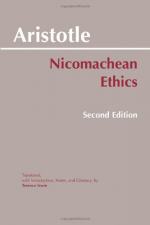
|
| Name: _________________________ | Period: ___________________ |
This test consists of 5 multiple choice questions, 5 short answer questions, and 10 short essay questions.
Multiple Choice Questions
1. What is the immediate source of action, according to Aristotle in VI.2?
(a) Desire.
(b) Choice.
(c) Need.
(d) Sense.
2. What sort of pleasures are said by Aristotle to not have an excess?
(a) Those whose contraries are painful.
(b) Those that are pleasureful incidentally.
(c) Those that are pleasant to the virtuous.
(d) Those that involve no pains.
3. What does the continent person have, by Aristotle's estimation, that the temperate person does not?
(a) Knowledge.
(b) Reason.
(c) Base desires.
(d) Ignorance.
4. How many things does Aristotle state there are in the soul that govern action and truth?
(a) Two.
(b) Three.
(c) One.
(d) Five.
5. With what sort of artists does Aristotle draw a comparison concerning the incontinent?
(a) Singers.
(b) Painters.
(c) Sculptors.
(d) Actors.
Short Answer Questions
1. With what sort of friendship is VIII.14 concerned?
2. Art, in the opinion of Aristotle, is concerned with what, according to VI.4?
3. In X.1, Aristotle says that people educate the young by what two means?
4. With what sort of friendship is VIII.12 concerned?
5. Which of the following is NOT one of the things that must be avoided, having to do with one's character, according to Aristotle's claims in the beginning of VII.1?
Short Essay Questions
1. Why does Aristotle state that mothers have greater love for their children than children for their parents?
2. Why does Aristotle state that words concerning feelings and actions are less believable than actions themselves?
3. In what way, for Aristotle, do the pursuits of actions in accord with the virtues that pertain to politics and war differ from those that pertain to contemplation?
4. For Aristotle, in what does the relationship between man's nature and his need for friends consist?
5. Why does Aristotle state that politics and practical judgment cannot be the highest or most serious things for man's consideration?
6. In what way does Aristotle agree with Socrates concerning knowledge and moral action?
7. Give an example of something affirmed by knowledge, as that which cannot be otherwise than it is.
8. What is meant by Aristotle saying that pleasures from different sources can be impediments to activities?
9. For Aristotle, in what way is a neutral or idle state detrimental to many individuals' moral character?
10. Explain the distinction, and its significance, between Socrates and Aristotle on the relationship between knowledge and moral action.
|
This section contains 969 words (approx. 4 pages at 300 words per page) |

|




